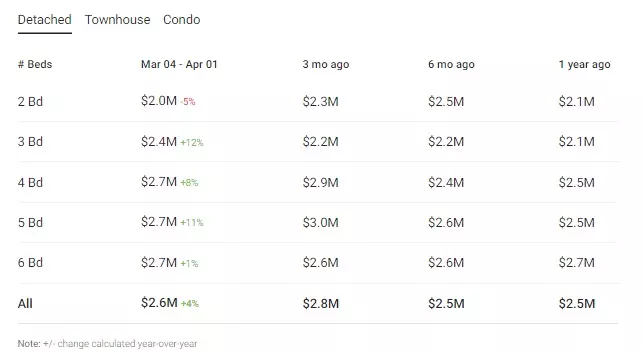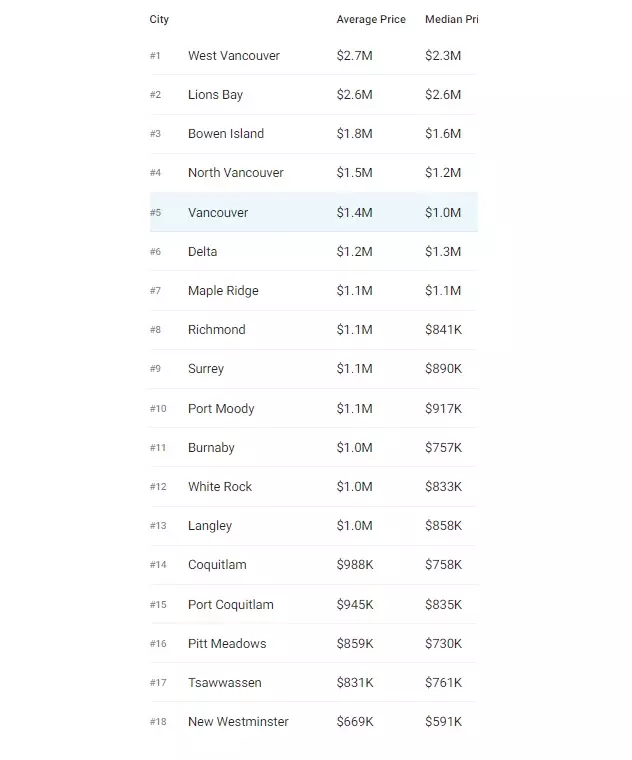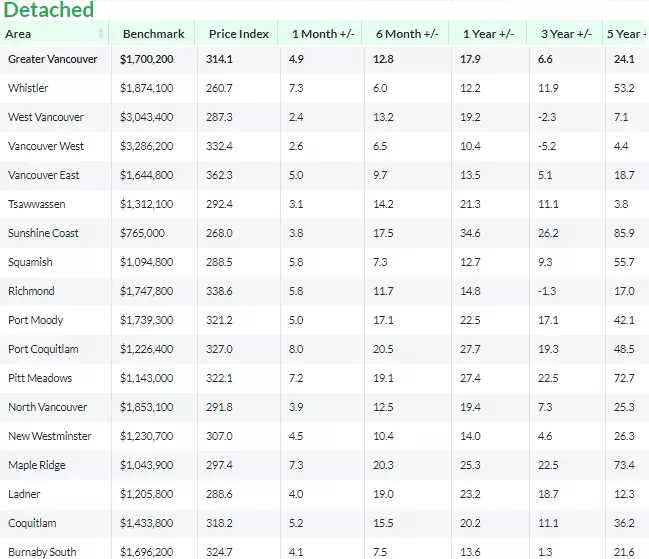Vancouver, known for its stunning natural beauty and modern cityscape, has captured the hearts of travelers, homebuyers, and investors from around the world. With its picturesque mountain vistas, moderate climate, thriving high-tech sector, and access to nearby recreational areas, it's no wonder that demand for homes in Vancouver remains high, despite astronomical prices.
Predicting the future of the Greater Vancouver housing market is no easy task. Factors such as the volatility of the US economy, geopolitics, rising interest rates, and financing costs make it challenging to make accurate forecasts. However, with the US and Canadian economies showing strong growth, it's expected that the Vancouver, Toronto, and Calgary housing markets will continue to thrive in 2022.
Economists anticipate a slowdown in 2023 as interest rates rise. However, the momentum from 2022 will not be easily halted. Given the housing shortages in Vancouver, home prices are expected to continue climbing at a steady pace. Even if prices were to decline, it would likely result in an influx of homes onto the market, keeping buyers, mortgage agents, and Realtors busy.
Over the past decade, Vancouver home prices have doubled on average, offering homeowners a substantial return on their investment. This presents an ideal opportunity for those considering selling their Vancouver homes to capitalize on the high market demand.
Let's take a closer look at the current state of the Vancouver housing market:
Vancouver March Housing Market Stats
In March, 6,673 residential properties were newly listed for sale in Metro Vancouver, a 19.5% decrease from the previous year. However, this marked a 22% increase from February 2022. Despite a decline in home sales compared to the previous year (down 23.9%), March saw a significant leap in sales, with a 26.9% increase from February.
The benchmark price for a house in Vancouver reached $2,118,600, with apartments averaging at $835,500. The chronic issue of housing supply continues to put upward pressure on prices. As immigration picks up, new construction slows, and inflation rises, houses will become increasingly unaffordable for most potential homeowners.
To gain a better understanding of home prices in different areas of Vancouver, let's refer to the following chart:

(Source: Screenshot courtesy of REBGV)
New Housing Development in Vancouver
Recent stats from BChousing.org indicate a positive trend in construction activity in 2021. This is particularly true for purpose-built rental units, which are gaining momentum in the Vancouver real estate scene.

(Source: Screenshot courtesy of BChousing.org)
Home Prices by City
When it comes to affordability, Vancouver faces significant challenges. The introduction of a new tax on foreign buyers may have a minor impact on the market, but it's unlikely to create inventory at lower price points. However, it may reduce prices for wealthy buyers.
The Real Estate Board of Greater Vancouver (REBGV) stated, "We're still seeing upward pressure on prices across all housing categories in the region. The number of homes listed for sale on our MLS® system today is less than half of what's needed to shift the market into balanced territory. Homebuyers are keeping a close eye on rising interest rates, hoping to make a move before their locked-in rates expire."
Here's a breakdown of average prices in various cities within the Greater Vancouver region:
| City | Average Price | Median Price |
|---|---|---|
| West Vancouver | $3.1M | $2.8M |
| Lions Bay | $2.5M | $2.6M |
| Bowen Island | $2.0M | $1.7M |
| North Vancouver | $1.6M | $1.5M |
| Delta | $1.5M | $1.6M |
| Vancouver | $1.4M | $1.1M |
| Port Moody | $1.4M | $1.2M |
| Surrey | $1.3M | $1.1M |
| Langley | $1.3M | $1.1M |
| White Rock | $1.2M | $1.1M |
| Maple Ridge | $1.2M | $1.3M |
| Coquitlam | $1.2M | $925K |
| Richmond | $1.2M | $890K |
| Port Coquitlam | $1.1M | $1.0M |
| Burnaby | $1.1M | $850K |
| Pitt Meadows | $1.1M | $1.0M |
| Tsawwassen | $987K | $775K |
| New Westminster | $901K | $742K |
(Source: Housing stats courtesy of Zolo.ca October Report)
Vancouver Home Price Predictions 2021
Several factors contribute to the positive outlook for the Vancouver housing market in 2021. Post-pandemic euphoria, the resumption of international trade, and the return of foreign students and investors are expected to give Vancouver's economy a significant boost. Experts have compared the current market to that of 2015, a period of high growth and prosperity.
Capital Economics' Stephen Brown forecasts a 3% rise in home prices in 2021, followed by a 5% increase in 2022. This prediction aligns with the rapid price growth Vancouver has experienced recently.
The British Columbia Real Estate Association (BCREA) also anticipates rising sales in 2021. Their recent report shows a projected 29% increase in sales, exceeding 120,000 units by the end of the year. However, sales are expected to decline by 15% in 2022, with 102,000 units sold.
While it's challenging to make precise predictions, the general consensus is that the Vancouver housing market will remain strong in the coming years. The return of tourists, vaccination efforts, and increased government support are all positive signs for the market's future.
Certainty is Returning to Markets
With the recent change in US leadership and the ongoing recovery from the pandemic, certainty is returning to markets worldwide. China, which has managed to contain the spread of COVID-19, is expected to play a crucial role in driving economic growth. Increased imports into Canada, destined for the US market, will support Vancouver's real estate market.
The resumption of international travel will have a positive impact on Vancouver's economy, benefiting various sectors, from downtown attractions to airports. The revival of the condo market is also expected once the pandemic is under control.
While Vancouver's challenges in terms of affordability and housing supply persist, positive economic indicators, such as the Canadian government's $100 billion stimulus package, offer hope for the future. Vancouver's role as a key port for Canadian exports, combined with increased investment in student housing projects, further strengthens its economic outlook.
In conclusion, the Vancouver housing market continues to present opportunities for both homebuyers and investors. While challenges remain, the high demand, positive economic indicators, and predicted future growth make it an exciting time for those interested in the Vancouver real estate market.

(Source: Screenshot courtesy of REBGV)

(Source: Screenshot courtesy of REBGV)
Remember, when buying a property in Vancouver, it's essential to consider the bigger picture and key economic events. Stay informed about neighborhoods that may experience price drops for potential investment opportunities. West Vancouver, North Vancouver, Burnaby, Port Moody, North and Port Coquitlam are areas that may be more vulnerable to price declines.
As we look ahead to the future, Vancouver's housing market is poised for continued growth and stability. With its enduring appeal and strong demand, Vancouver remains a vibrant and enticing destination for homeowners and investors alike.
Note: The content and images used in this article are based on the original article here and are used for illustrative purposes only.

















